Why do guinea pigs nibble you? Guinea pigs nibble you because they are hungry, they have mistaken you for food, for the fun or chewing or because they are scared. And that’s not all! Today we share the reasons why guinea pigs nibble, help you to understand what is making your pig bite and give you tips to stop them nibbling your fingers or clothes.
- Why do guinea pigs nibble you?
- Do guinea pigs bite?
- What should I do if my guinea pig bites me?
- How to tell if your guinea pig likes you
- How to stop guinea pig nibbles
Guinea bites rarely bite with the aim of hurting their victim. But, they frequently nibble gently at members of their social group, to achieve a variety of purposes, or send an assortment of messages. Interpreting a cavies nibbles is simply a matter of observing them often, and getting to know them well. In this detailed guide to why do guinea pigs nibble you, we take a look at what it means when your pet gently bites or licks your skin, and whether you ought to do anything about it.
In this video you can see Kandis the guinea pig nibbling her owner’s nose. Let’s find out what she’s trying to communicate!
Do guinea pigs bite?
Guinea pigs rarely bite with the intention of hurting their target. When guinea pigs bite hard it is usually due to one of two reasons:
1. To establish a dominance hierarchy in their social group
Usually this means males fighting each other to achieve a social hierarchy, but occasionally females fight each other to assert their social status too. This behavior typically escalates over several days, until a new social order is established, or the old one is upheld. At its pinnacle, guinea pigs might bite each other hard enough to draw blood (and if it gets this bad, you’ll need to separate them).
2. They’re scared
If a guinea pig bites a human, it is almost certainly because they are frightened. Guinea pigs are a prey species, and they are neither agile at self defence, nor particularly quick at running away. In fact they usually rely on hiding in dens during the day, and freezing on the spot if they notice a predator whilst out grazing. But, if you back an unfamiliar guinea pig into a corner of their hutch and try to make a grab for them, then they will use biting as a final resort to try and get rid of you. Importantly, if it succeeds in getting you to back off once, they might learn to use the same behavior again in future. We’ll put some links at the bottom of this article with help on how to avoid falling into this trap.
Why does my guinea pig nibble me?
So, hard guinea pig biting is unusual. But gentle guinea pig biting is a different matter altogether. A gentle guinea pig bite feels like having your skin very lightly pinched. There’s little force behind it – nowhere near enough to break the skin. This kind of nibbling is very common between guinea pigs, and also between guinea pigs and their favorite humans. Here are all the purposes it serves:
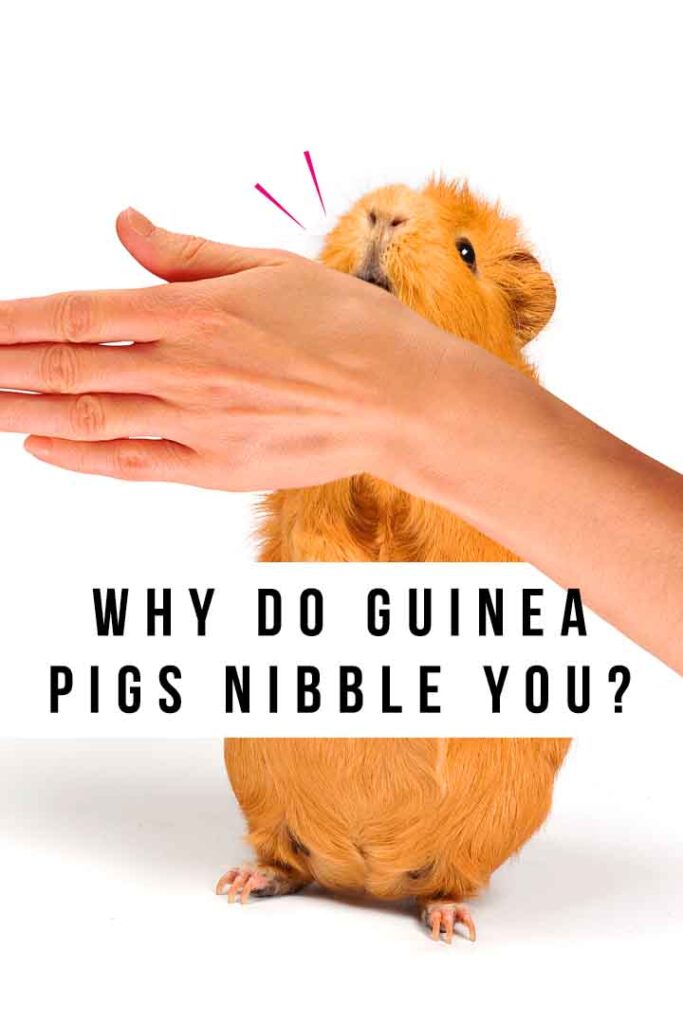
1. Keeping clean
Guinea pigs have a strong instinct to keep their fur clean. Not only does clean fur provide better insulation, it also reduces the risk of skin infections, and makes their odor less discernible to predators. But, some bits of their anatomy are harder to reach than others. And that’s where their friend come to the rescue, by nibbling little bits of dirt out of the fur they can’t reach. The technical behavioral term for this is ‘allogrooming’.
2. Bonding
Guinea pig’s wild ancestors live together in herds of 10 individuals or more. Besides the practical business of ending up cleaner, guinea pigs who groom each other also build up and maintain stable social bonds, enabling them to live peacefully together. In fact it works at a completely subconscious neurological level – allogrooming behaviors are triggered by the release of oxytocin in the brain. Oxytocin is also known as the ‘love hormone’ due to the important role it plays in social bonding and maternal bonding. So, nibbling each other as an expression of affection is something guinea pigs don’t even have to think about.
3. Reducing stress
Allogrooming is so effective at making guinea pigs feel better that they even use it to reduce stress. And if the herd senses that one individual is stressed, they will nibble and groom them to restore their spirits!
4. Parenting
Finally, guinea pigs nibble their offspring too. And this time it serves all three of the functions above – cleaning, bonding, and comforting.
What does it mean when your guinea pig nibbles on you?
Now we’ve seen why guinea pigs developed the habit of gently nibbling at each other, let’s see why they might apply that behavior to you specifically! Obviously you don’t have fur that needs cleaning, and they’re not going to mistake you for one of their offspring. We can’t really speculate about whether they can detect your stress levels – the research just doesn’t exist yet. Which leaves one reason we can rely on – your guinea pig is nibbling you because they regard you as a member of their social group, and their instincts tell them to cement and reinforce that bond with a gentle nibble. In other words, it’s a guinea pig’s way of giving you a hug!
What should I do if my guinea pig bites me?
A guinea pig nibbling you is a sure sign they think of you as a friend, and even as part of their family. So there’s nothing you need to do about it (except perhaps pat yourself on the back for being such a beloved owner!) However, we do recommend that you wash whatever bit of you got nibbled right after you’ve finished handling them. Guinea pigs tend to keep a cheek full of semi-chewed up food stored in their mouths at all times. And bear in mind this may include matter from cecotrophs – partially digested feces that are intended to be re-eaten. So, guinea pigs’ mouths aren’t the cleanest of environments. You definitely want to wash any bit of you that comes into contact with them, before bugs can get transferred to your eye, nose or mouth.
If a guinea pig ever bites you hard enough to draw blood, wash the wound for several minutes under clean running water, and seek immediate medical advice.
How to tell if your guinea pig likes you
If your guinea pig doesn’t nibble you, don’t worry! Just like people express affection in different ways, and not everyone does it with hugs, there are other ways a cavy can express their fondness too. Since they are a prey species, and hardwired to mistrust anything bigger than they are, then not immediately running away when you arrive might feel like a lukewarm reception, but is actually an enormous expression of trust. You can listen out for these sound effects too, which guinea pigs use to express pleasure:
- Wheeking. Wheeking is loud noisy excitement – it’s impossible to miss or mistake for anything else. It could be purely personal because they’re happy to see you, but more likely it’s because they’re excited about the food they hope you’ll be carrying (sorry).
How to stop guinea pig nibbles
Guinea pig nibbles are their way of showing a bit of love. But if you’d rather not receive them, that’s fine. As long as your guinea pig has at least one other cavy companion, they’ll be happy enough to nibble on them instead. To prevent them nibbling on you, always have a carrot stick or handful or hay or grass to offer them when you handle them. They’re likely to regard eating it as more important than nibbling you! Never punish them if they do nibble you though – it could scare them off and ruin your relationship for good.
Why do guinea pigs nibble you – summary
Guinea pigs nibble people as an affectionate sign that they consider you a friend. Congratulations! It’s a good idea to tell people who haven’t handled guinea pigs before about this behavior before they pet yours, so they don’t misinterpret it as biting and panic. If your guinea pig always gives you a good nibble, we’d love to hear about it in the comments box down below. Is it part of a little ritual when they see you, or more spontaneous?
And last of all, here are the resources we promised for handling guinea pigs safely without frightening them:
- How Long Does It Take To Tame A Guinea Pig?
- Do Guinea Pigs Bite?
- How To Hold A Guinea Pig For The First Time
- Guinea Pig Sounds: A Guide To Guinea Pig Noises
- Baytril for Guinea Pigs
References
Adrian et al. Paternal behaviour in wild guinea pigs: A comparative study in three closely related species with different social and mating systems. Journal of Zoology. 2005.
Albers et al. Maternal Behaviour in the Guinea Pig (Cavia Aperea F. Porcellus): a Comparison of Multiparous, and Primiparous, and Hand Reared Primiparous Mothers. Netherlands Journal of Zoology. 1999.
Matsumoto et al. Indispensable role of the oxytocin receptor for allogrooming toward socially distressed cage mates in female mice. Journal of Neuroendocrinology. 2021.

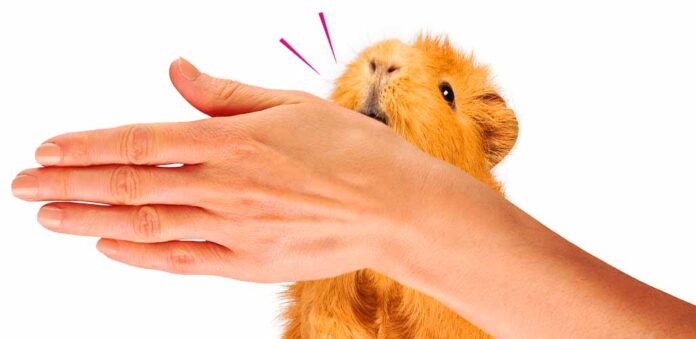
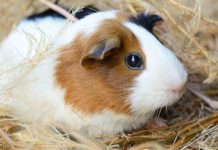
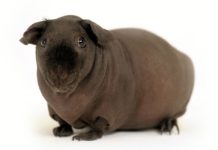
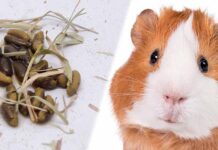











My Geniupig Max bit me and it hurt he has never done it before thus is the first time